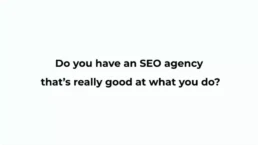by Venchito Tampon Jr | Last Updated on August 2, 2023
One of the best ways to acquire new customers is to get your business on top of Google search.
By hitting the top search spot for specific commercial and informational keywords, you bring visitors who would potentially convert into customers of your brand. You also help your site be perceived as a trusted solution for products or services.
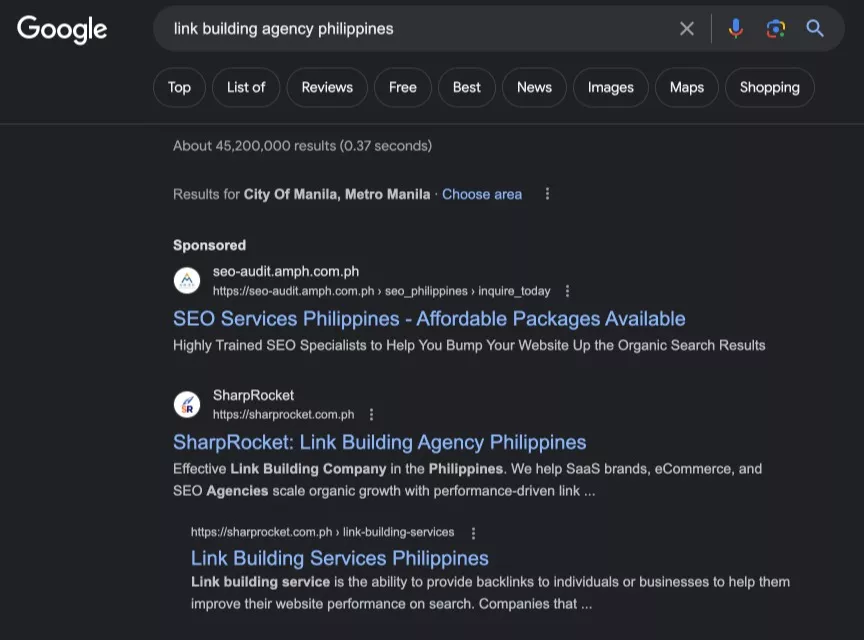
Here are some initial steps you can take to optimize your website for online rankings. Either you do it yourself or hire an SEO agency to do it for you.
How to Get My Business on Top of Google Search
Create Landing Pages For Target Keywords
The absence of a target keyword on a webpage is why some websites can’t rank for competitive search terms.
Having a target keyword on a specific page allows Google to understand the topic of your webpage and tells them how relevant it is to a target search query.
Let’s say you want to rank for “espresso machines in the Philippines”. You need to target the keyword “espresso machines Philippines” on your webpage.
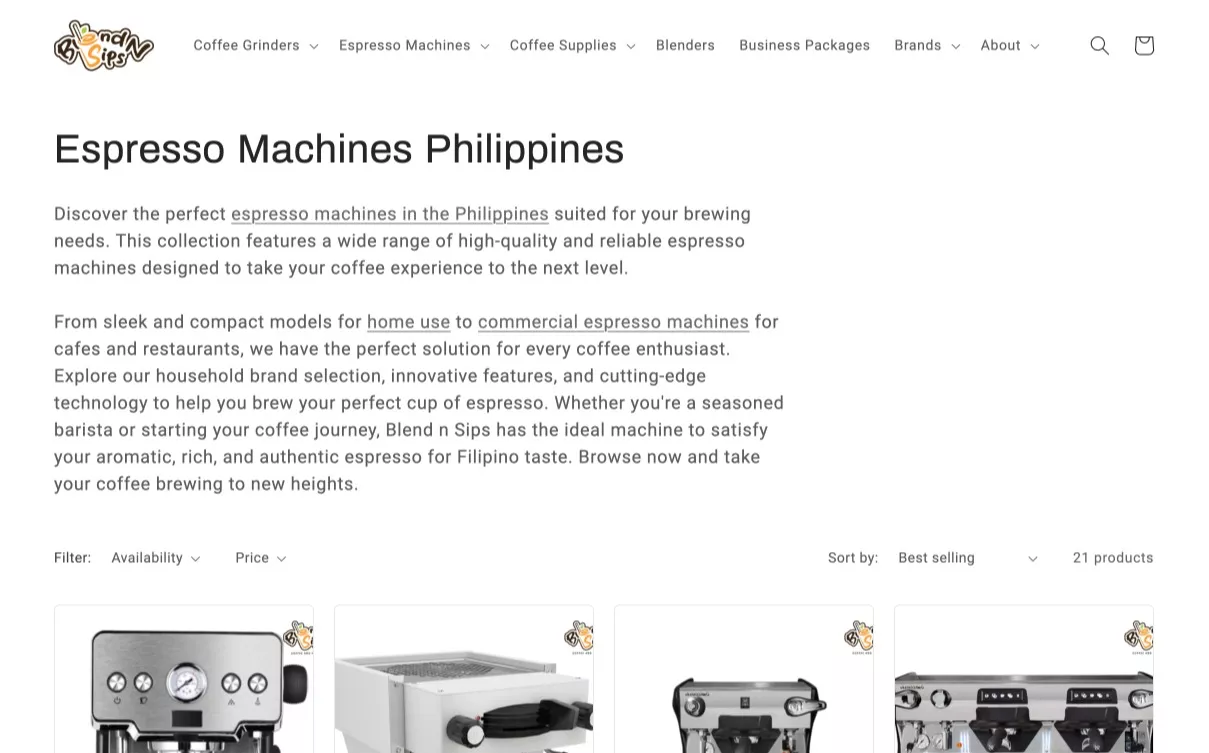
Choose one keyword for each dedicated landing page.
For instance, if you have 10 product categories, you select 10 keywords dedicated to each category. The same is true with service-type businesses. Pick one keyword suitable for your service page.
So list all services or products you want to appear on your website. And conduct a keyword research process to identify the keywords you want to target for each webpage.
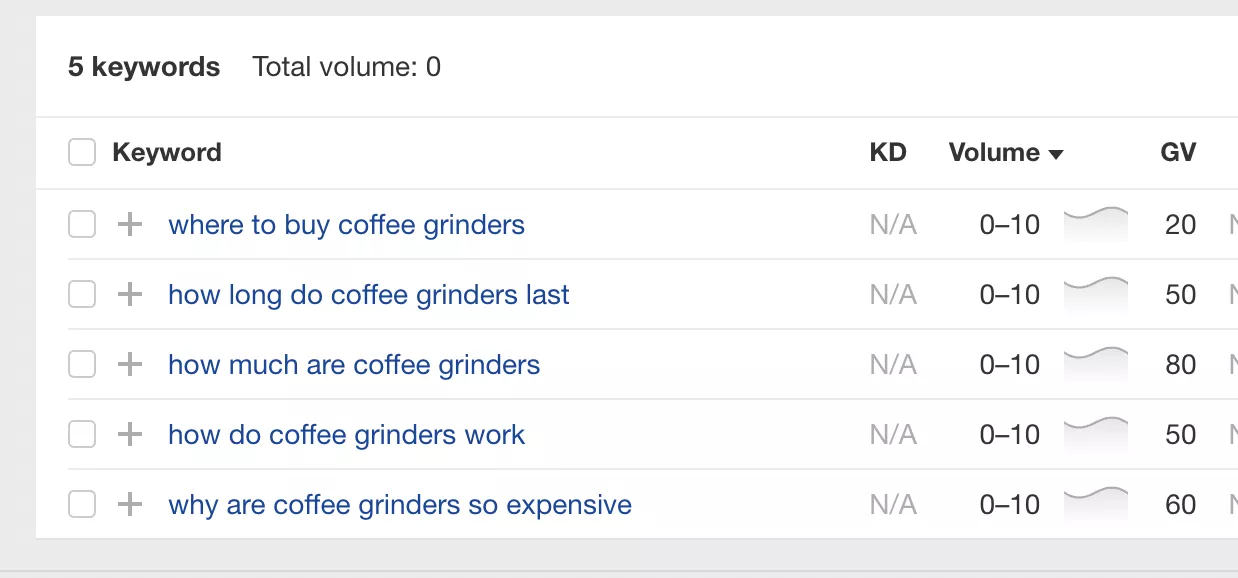
At most, you want to have dedicated pages for the homepage, product page, product category page, service page, opt-in page, about page, etc.
Make Rich Content For the Bottom of the Funnel Pages
The bottom of the funnel pages are your bread and butter pages, mainly product, product categories, or service pages. These assets bring constant money to your business (“money pages”).
With my eCommerce consulting experience, I’ve seen eCommerce sites wanting to rank for their commercial keywords yet having thin content on their product categories, even worse, duplicate product details from their manufacturers’ copy.
I recommend adding at least 500 words to your product categories.
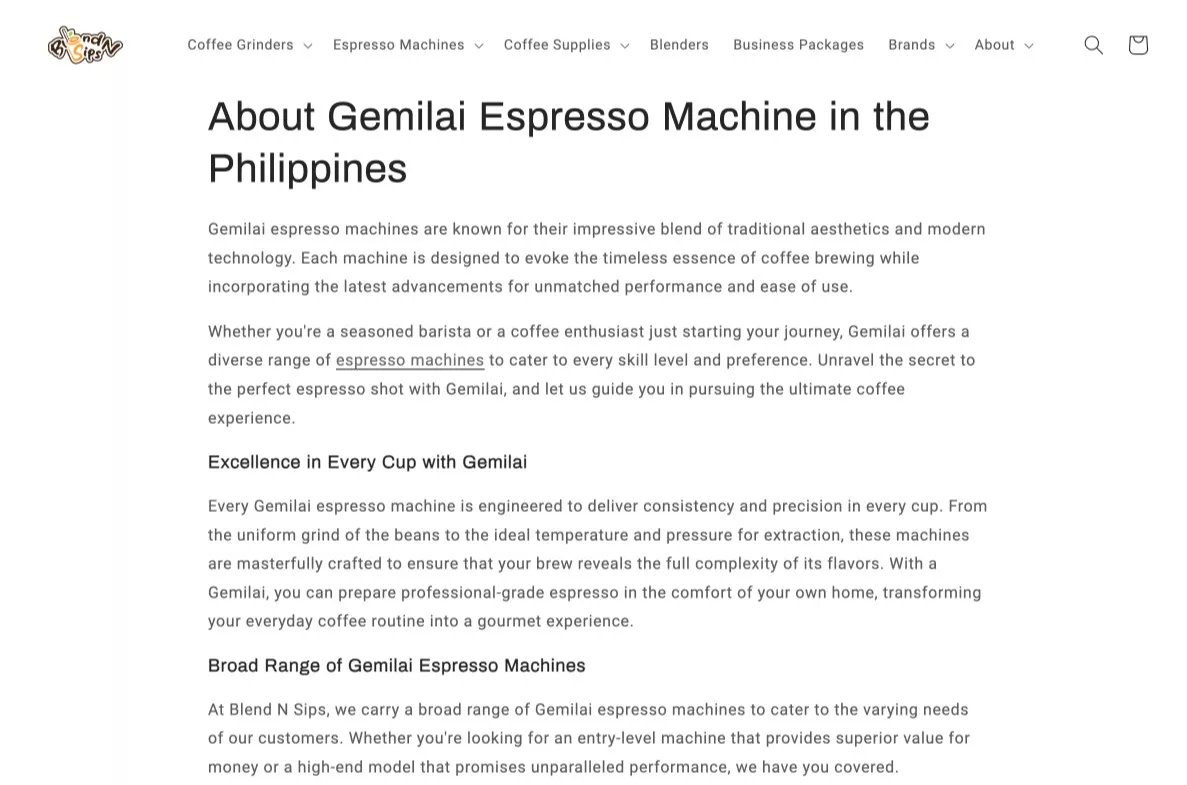
You can address your target customers’ objections to purchasing products to increase engagement and conversions.
It could be sections about the following:
- Benefits of your product category (collection page).
- Unique value position (UVP) of your brand against its competitors
- A quick history of your product
- FAQs (Frequently Asked Questions) when purchasing a product type
All this rich content could provide context and more relevant signals to your site’s content theme.
You get an advantage over competitors with thin or duplicate product/product category pages by writing rich content for product pages.
Optimize Pages for Low Time to Value
Time to value is a concept coined by Ross Hudgens that refers to how fast a visitor gets value from specific content.
A longer time on a page doesn’t tell the entire story. Most low visitor time on page means that a searcher has satisfied with the information he has seen on the webpage.
This means that the search user doesn’t have to stay for 10 minutes if he can get the correct information from your webpage and be satisfied with it in seconds.
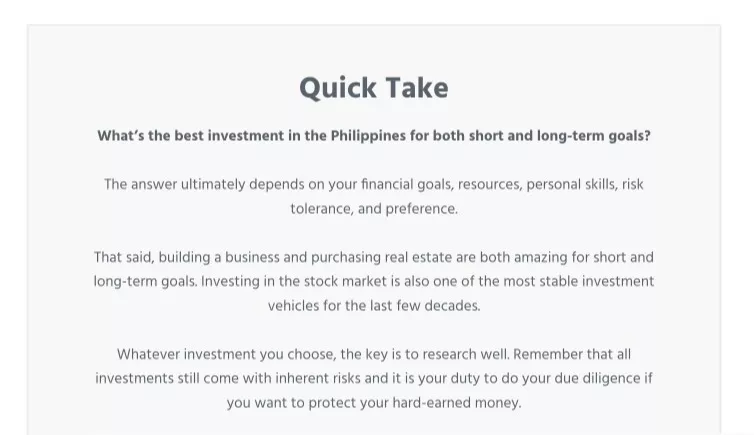
How to optimize pages for lower time to value:
- Place important information on top of your content. Make it easy for users to consume it without scrolling down until the bottom of the page.
- Add tools, visuals, and other interactive content types to increase user engagement and make your content easy to understand.
- Add TL;DR placed on top of blog posts to provide a quick summary of your post.
You aim to make your content the last click. Since you satisfy a user query, they’re less likely to return to Google search results for another result. Being the “last click” can be a good sign of satisfying content.
Publish Blog Content To Build Topical Authority
Not all blog content can best serve your website. You need the correct type of informational content that helps build the topical authority your site needs to rank quickly for its target keywords.
It starts with finding the informational content that can push visitors down to your business’s sales funnel.
For instance, if you’re selling “coffee grinders”, think of the keywords your customers are searching for when they are interested in buying or are simply looking for information related to “coffee grinders.”
As an example, here are some informational topics you can target for “coffee grinders”:
- How long do coffee grinders last
- How much are coffee grinders
- How do coffee grinders work
- Why are coffee grinders work so expensive
One SEO misconception today is that lower search volume won’t help drive search traffic to your website.
It may be valid from individual pages targeting the search query. But in the grand scheme of your domain, you’re enhancing the topical authority of your website, giving signals to Google of the quality of content, expertise, and experience of your website.
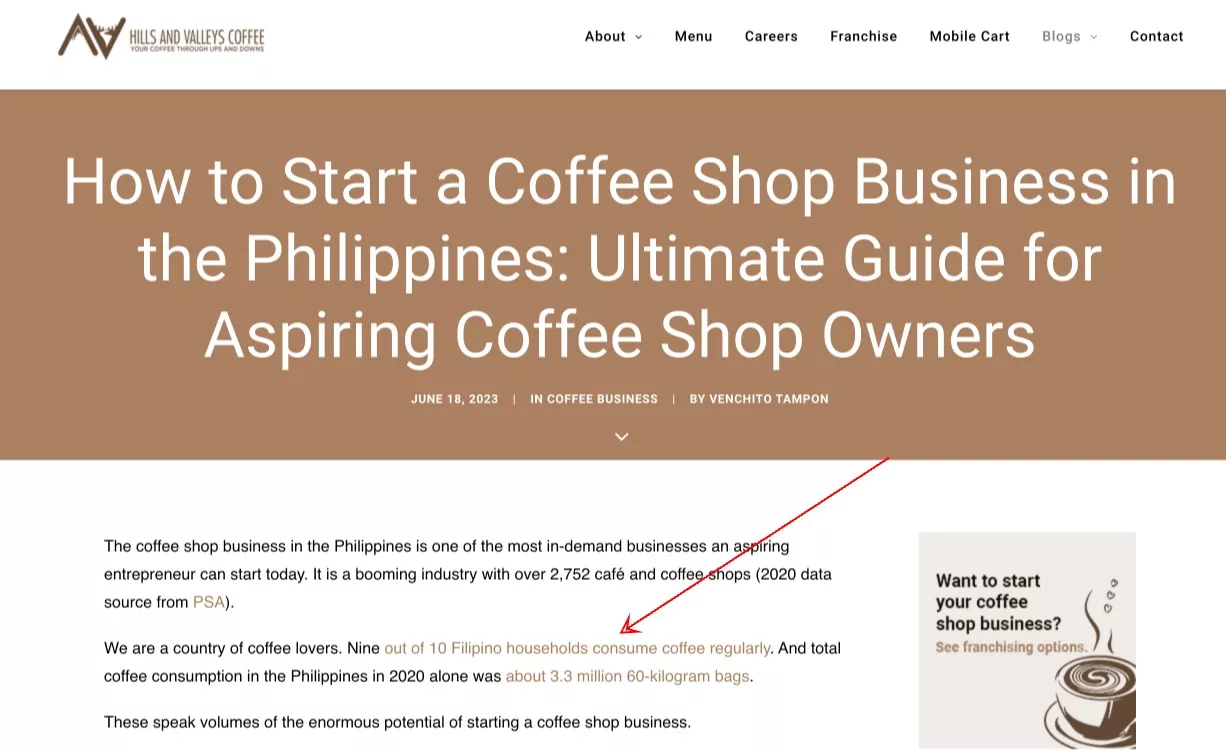 ‘
‘
Doing so helps you quickly rank even better for other related keywords.
Target one topic cluster at a time, preferably the ones your business would want to be on top of Google search.
In my given example, I would first create a topic cluster for all keywords related to coffee grinders. Then, publish all relevant informational content on “coffee grinders.”
Then, once I’ve finished shelling out “coffee grinders” content, I can move to other topical clusters, such as “espresso machines.”
You want your business to be seen as a topical authority in a niche. And even with a low authority site, you could drive organic traffic and online revenue to your website by building a robust topical authority.
You can check out this guide on the importance of topical authority and semantic SEO.
Hire Human Expert Writers
In the age of AI-driven content, you could publish 50 to 100 articles monthly using tools like ChatGPT, Frase, and other AI tools to help you scale content marketing for your blog.
While that’s an advantage to lower operational costs and increase efficiency.
In industries where Google strictly assesses the quality of content, in the case of Your Money, Your Life content, you’re more likely to get higher returns if you hire human expert writers.
Human expert writers, especially the creative ones, can use their expertise and experience to craft more rankable content than AI content.
The recent experiment from Reboot Online clearly showed that AI-generated content ranked less strongly (on average) than human-generated content.
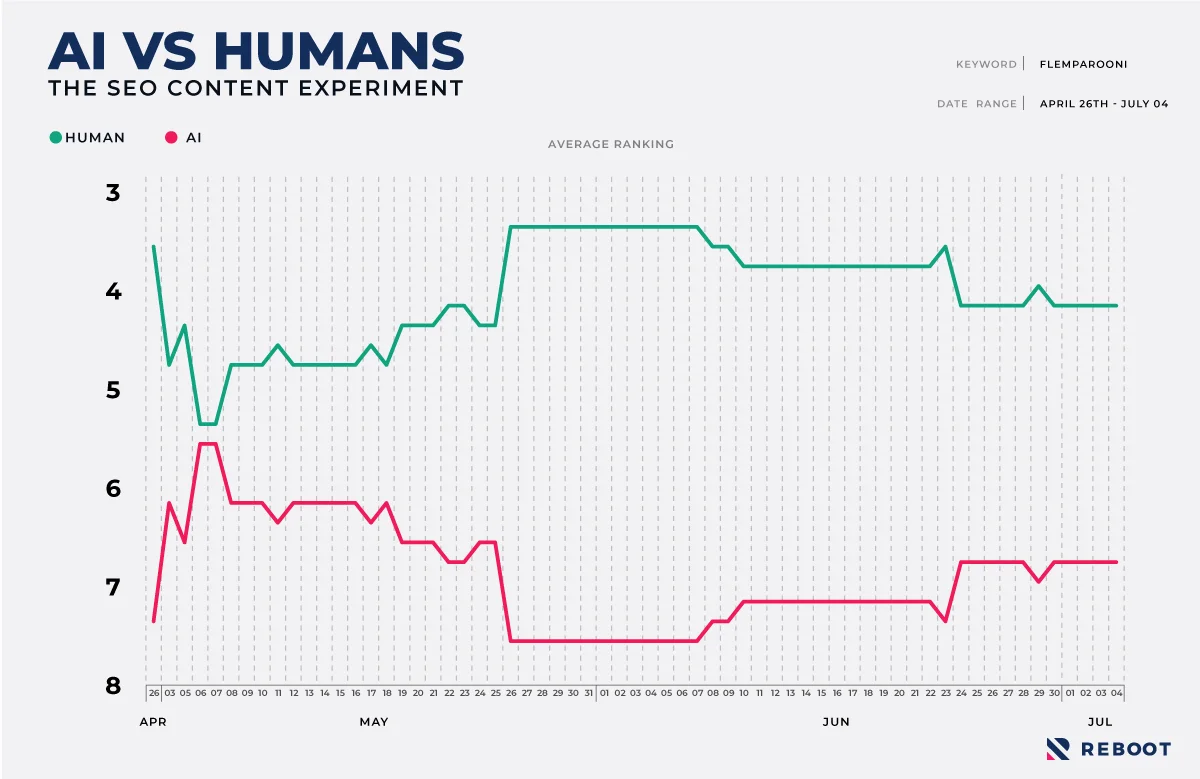
It may only apply to some industries, but with niches where high specialization is required, you should hire human expert writers for your blog search engine optimization needs.
Here are more tips when creating content with human expert writers:
- Bring your writer’s experience into the content. With E-E-A-T, you could get higher organic visibility by pushing out content with the author’s unique experiences, making it different from all other high-ranking pages.
- Search for active authors in your space, and incentivize them to write for your blog. Either hire them, give premium access to a product, online store vouchers, or any incentivization methods to get them to contribute content for your blog.
- Through these authors’ reputations in the industry, you can leverage these entities’ associations with your site, making your brand more recognizable.
- Invest in hiring specialized experts that are also good writers. It would be much easier for content to fly its performance when the quality of information is solid and comprehensive enough than content written by general SEO writers.
Hiring human expert writers provides better opportunities for quality content and building your brand as a thought leader and subject matter expert in your niche.
Effective On-Page SEO
While the quality of content helps in driving user engagement, you can’t ignore the best on-page SEO practices to put into play. If you want to climb Google’s rankings, you need to ensure you’re putting your keyword in the following fields:
- Title tags
- Meta description
- Body text (i.e., opening sentence)
- H1, H2 text
- Image alt text
Here are some on-page guides to help you get started:
Manage Technical Health
Technical SEO is laying the groundwork to build the foundation for your SEO success. Without it, there will be limitations to skyrocketing your site’s organic traffic in Google’s search engine results pages (SERPs).
Taking care of it as you start your website or as part of your preliminary SEO process is a game-changer. This includes having the proper technical knowledge of crawlability and performance security.
Here are some guides to give you a more breadth discussion on technical SEO:
Build The Right Type of Backlinks
Backlinks are still king. If you’ve done an excellent job with your technical SEO, on-page SEO, and content, you need backlinks to climb Google’s SERPs.
Link building helps improve the crawlability of your site. It adds more semantic SEO signals to your website through external web assets (i.e., guest posts, profile pages, and brand mentions, which not only help you get the desired rankings but increases your brand awareness.
Contextual links are the correct type of links to pursue, as it allows you to choose specific anchor texts that will give weight to the value of the link you acquire from the website.
As a business owner, you can pursue many link opportunities using the link building strategies that fit your website, industry, size, and resources.
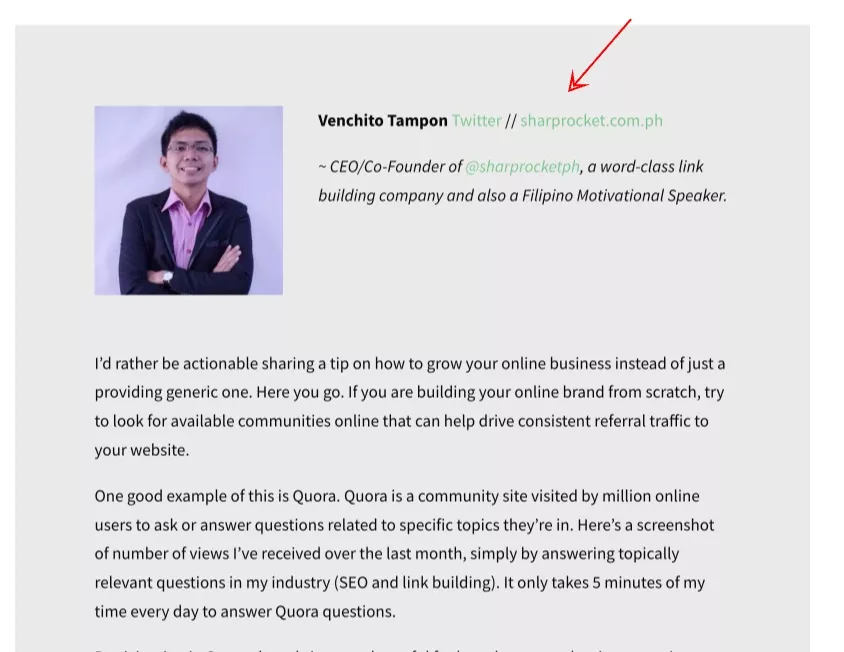
Here are some actionable guides from years of experience to give you a headstart in building the correct type of backlinks:
Aim For Freshness of Content
Publishing new content and updating the old ones to satisfy better search users is highly correlated with Google rankings.
That said, you can’t neglect the power of SEO blog writing to publish newly fresh content on your website. It helps in faster crawlability and can also assist you in getting passive links via ranking for informational keywords.
If your website constantly publishes new quality content for a particular topic cluster, you’re building your site’s topical authority on that niche content theme. And thus, it gives you more relevant signals to rank quickly for any keyword within the topic cluster.
On top of new content, you must also update your existing content. You’ve done work writing those content assets, and it only takes a few more hours to update and get ranking rewards from this initiative.
How to aim for content freshness:
- Create a content calendar to publish relevant content for your blog consistently. By having a systematized process, you can produce constant quality output from your pool of writers.
- Hire and train good writers. Through in-house training, you develop the quality and discipline of your writers, making it easier to foresee regular updates to your blog.
- For old existing content, check the freshness distance of each ranking page for your target keyword. See how many months or weeks ranking websites update their pages. If it is three months, six months, or a year, then you must account for it when you make your content fresh.
Don’t Ignore Long Tail Keywords
As a business owner or SEO client, thinking only for your primary head terms is usually one or two words (i.e., coffee machines). That’s your top traffic and potential revenue generator, as they typically have a high search volume.
However, don’t ignore targeting long-tail keywords with your pages. Especially if you’re starting to do SEO for your website, you won’t have much site authority to compete for competitive head terms where ranking websites have a DR50 and above.
That said, you can quickly get search traffic simply by ranking for long-tail keywords that most industry giants would ignore.
You can use Ahrefs to find these long tail keywords, or with Google Autocomplete and Suggestion Box at the bottom of Google’s SERPs, you’re likely to see different variations of industry terms and long tail keywords you can rank with content.

Use Authority Sites To Rank For Competitive Keywords
While you can’t easily rank for competitive head terms with a new domain, you can quickly use other authority sites to rank for competitive industry terms.
Take a look at this screenshot from Charles Floate. These pages rank for YMYL content, such as pharma, which would take hundreds of links to get to the same spot.
All these ranking pages are published and sponsored by brands to get the rewards of constant referral traffic back to their site.
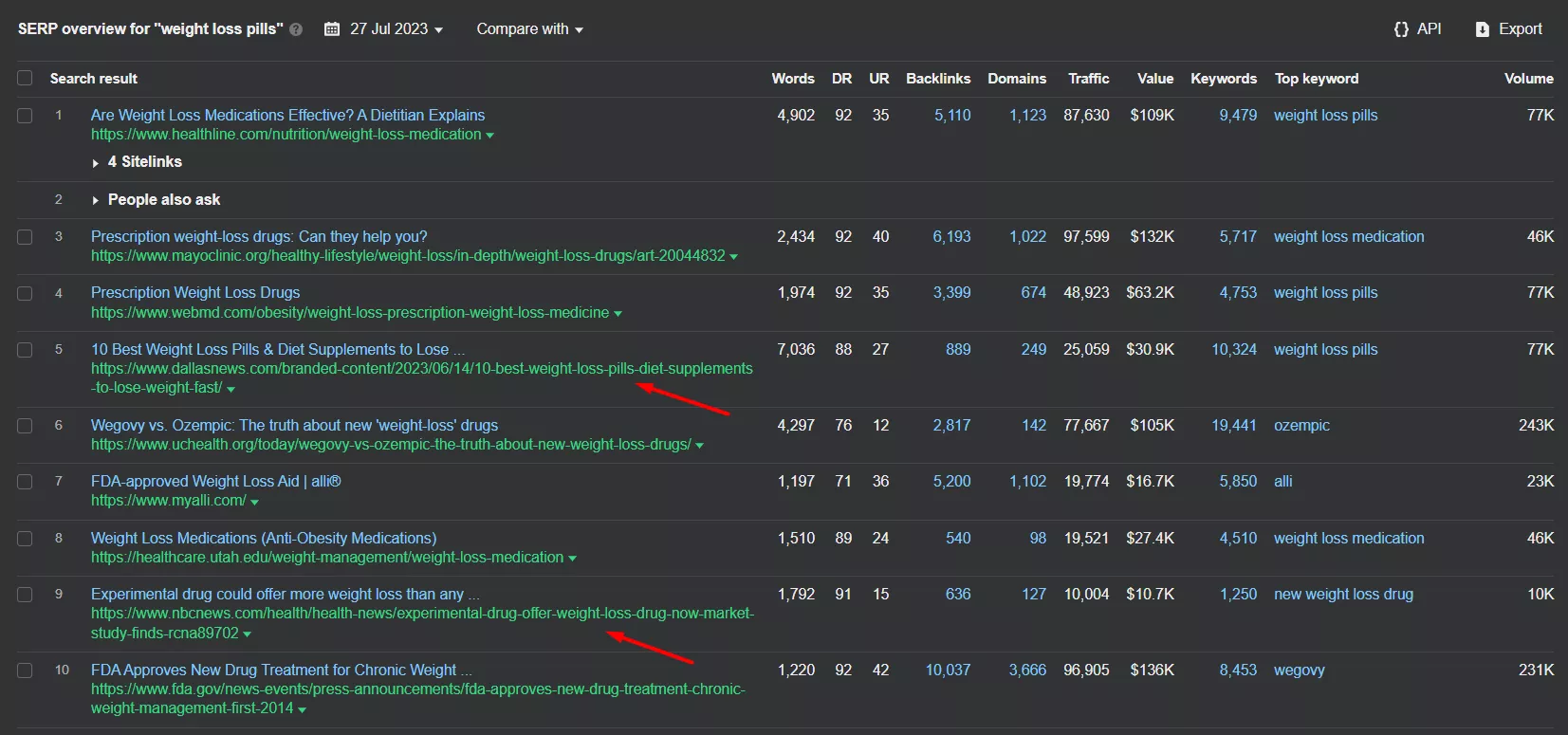
How to use authority sites for link building:
- Find industry sites trusted by Google where you can craft and publish content and quickly rank for your target keyword. Use the keyword as a URL slug in your “guest post” (i.e., best espresso machines).
- Link out to these authority sites before doing outreach. You’ll succeed more in getting content partnerships when you’ve featured them first on your website.
- Build more contextual links to your site’s other external content (guest post) from another guest post (tiered link building) to boost all external pages’ linking power, which can immensely help your domain’s online rankings.
Associate your brand with authoritative entities, as it could benefit you in many ways, especially in the age of E-E-A-T, where trust and authority sites linking to you can have a powerful impact on your site’s branding and rankings.
Dominate Local Map Packs
If your business is targeting customers within a city, region, or small country, local SEO is an integral part of your search engine optimization campaign.
You would see that a huge prime real estate for local SEO comprises local map packs with the highest clicks.
You can rank for organic search engine results pages, but with local map packs appearing on top of it, optimize your brand for local map packs and acquire more brand exposure.
Here are actionable tips to dominate local map packs:
- Create and optimize your Google Business. Ensure you have a complete profile, actual reviews of customers, and accurate business information. See this guide to optimize Google Business Profiles.
- Place NAP (Name, Address, Phone Number) across all your important pages on your website.
- Get local citations. Start from this list of best citations.
- Localize your website content by optimizing for local-centric keywords (coffee shop in New York).
- Get links from websites representing the same target local area.
- Place QR codes on your stores, incentivize customers to get reviews for your Google Business Profiles.
Acquire online real estate by being visible on organic search engine results pages (SERPs) and local map packs. Vying for both places increases organic visibility for your business.
Get Your Business On Top of Google Search
The best practices in ranking your website on top of Google searches differ from industry to industry, so better have a good context of your brand, content, and resources.
By following the actionable tips above this article, you can expect a gradual growth of progress for your site’s organic traffic and online revenue.
If you want to get your business on top of Google search, our SEO and link building services can help you.
The Author
Venchito Tampon Jr
Venchito Tampon is a Filipino Motivational Speaker, Corporate Trainer, and a Leadership Speaker in the Philippines. He is the CEO and Co-Founder of SharpRocket, a link building agency. With a decade of experience, Venchito has a proven track record of leading hundreds of successful SEO (link builidng) campaigns across competitive industries like finance, B2B, legal, and SaaS. His expert advice as a link building expert has been featured in renowned publications such as Semrush, Ahrefs, Huffington Post and Forbes. He is also an international SEO spoken and has delivered talks in SEO Zraz, Asia Pacific Affiliate Summit in Singapore, and Search Marketing Summit in Sydney, Australia. Check out his other businesses, Hills & Valleys Cafe, Blend N Sips and Saas Pursuit.
How our LINK BUILDING AGENCY builds 250 links/mo consistently using Predictable Link Building Methodology™…
- Using a SIMPLE and PROVEN system
- Using a SCALABLE strategy
- No private blog networks
- No creepy outreach emails
